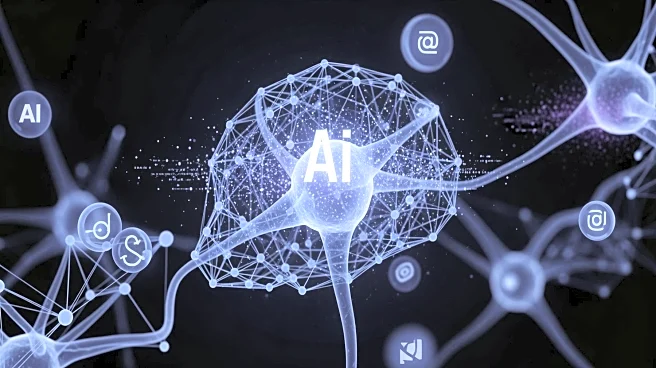What's Happening?
A Japanese scientist, Tomoyasu Horikawa, has developed a groundbreaking technique that uses brain scans and artificial intelligence to convert mental images into descriptive text. This method, termed 'mind-captioning,' employs AI to interpret brain activity
related to visual details such as objects, places, and actions. The study involved scanning the brains of participants as they watched video clips, with AI models trained to match brain activity to numerical sequences representing the video content. The technology has shown potential in assisting individuals with communication difficulties, such as those with aphasia or ALS, by generating text descriptions of visual content without relying on language-related brain regions.
Why It's Important?
The development of this technology could have significant implications for individuals with communication impairments, offering new ways to express thoughts and ideas. However, it also raises ethical concerns regarding mental privacy, as the ability to decode thoughts could lead to unauthorized access to personal mental data. The potential for misuse by companies or governments highlights the need for strict regulations to protect individuals' mental privacy. As AI continues to advance, balancing technological benefits with ethical considerations will be crucial to ensure that such innovations are used responsibly and with consent.
What's Next?
Future developments in this field may focus on improving the accuracy and practicality of the technology, as current methods require extensive data collection and participant cooperation. Researchers and policymakers will need to address the ethical and privacy challenges posed by this technology, potentially developing legal frameworks to regulate its use. As interest in neural interfaces grows, particularly from companies like Neuralink, establishing guidelines for mental privacy and consent will be essential to safeguard individuals' rights.
Beyond the Headlines
The potential for this technology to decode thoughts from infants, animals, or even dreams opens new avenues for research but also intensifies privacy concerns. The possibility of 'mind-reading' technology becoming mainstream necessitates a reevaluation of privacy laws and ethical standards. As AI becomes more integrated into daily life, ensuring that neural data is treated as sensitive and protected by robust consent mechanisms will be vital to prevent exploitation and maintain public trust.















